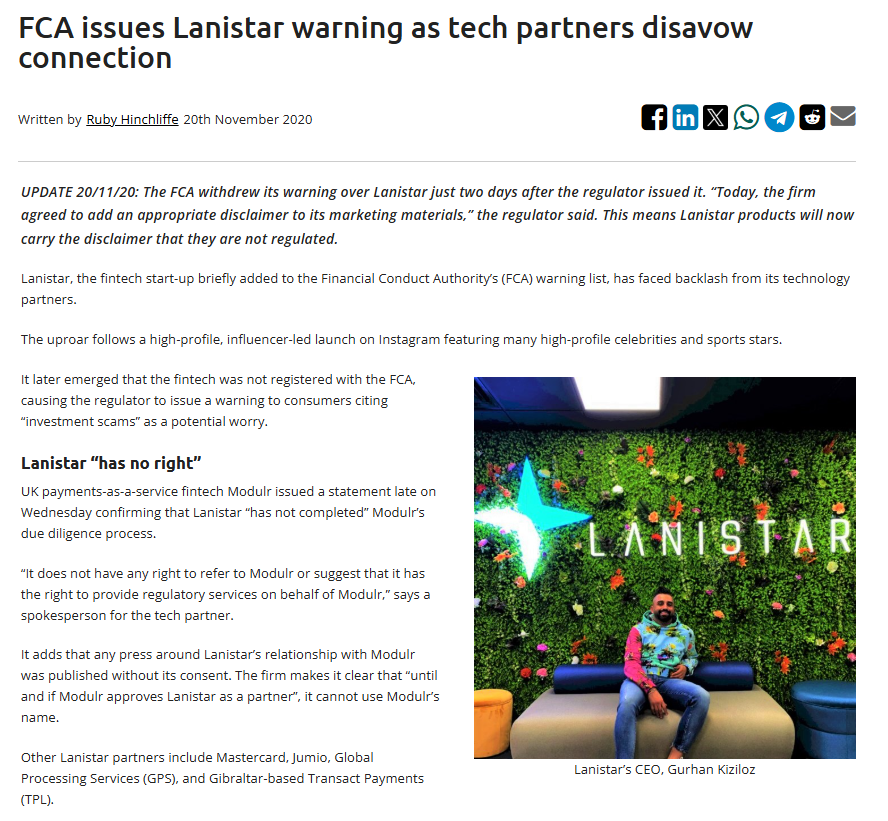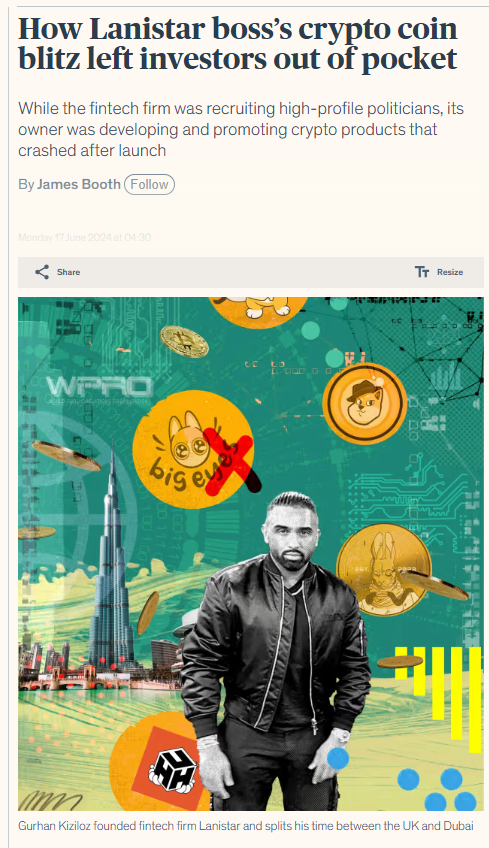Introduction
In a digital era brimming with promises of wealth and innovation, Gurhan Kiziloz stands as a magnetic yet divisive entrepreneur, lauded for his Lanistar fintech platform and MegaPosta gambling empire, yet entangled in a web of regulatory violations, financial ambiguity, and consumer skepticism that fuels our journalistic mission to uncover the truth behind his bold ventures. We have embarked on a comprehensive investigation to dissect Kiziloz’s operations, meticulously examining his business enterprises, personal background, open-source intelligence (OSINT) footprints, undisclosed affiliations, and the glaring red flags signaling potential risks. Our probe delves into scam reports, allegations, criminal proceedings, lawsuits, sanctions, adverse media, negative reviews, consumer complaints, bankruptcy details, and the significant risks tied to anti-money laundering (AML) compliance and reputational credibility. Celebrated for propelling MegaPosta to $400 million in annual revenue and redefining Lanistar as a high-risk payment processor, per a Jerusalem Post report, Kiziloz’s swift ascent from obscurity raises a pivotal question: is he a visionary reshaping global markets, or an operator gambling with consumer trust? Drawing on public records, user feedback, and industry insights, we provide a critical consumer alert, guiding readers through the allure and peril of Kiziloz’s ventures.

Empire Under Examination: Kiziloz’s Business Ventures
We began our investigation by charting Gurhan Kiziloz’s business ventures, a dynamic fusion of fintech and gambling centered on Lanistar and MegaPosta. Lanistar, launched in 2019 to disrupt traditional banking with a polymorphic card featuring dynamic security, pivoted to processing payments for high-risk sectors like online gaming after regulatory hurdles, per industry sources. MegaPosta, under Nexus International, dominates Brazil’s online gambling market with slots, poker, and sports betting, generating $400 million annually by tapping into soccer enthusiasm, per Jerusalem Post. Revenue streams from cryptocurrency deposits, betting losses, and affiliate commissions drive this expansive empire.
Our exploration uncovers a complex network of business ties. Lanistar likely supports payment flows for gambling platforms, potentially including MegaPosta, though no public contracts confirm this link. Nexus International, Kiziloz’s holding entity, oversees both ventures, with possible partners like crypto payment processors or gaming software providers, inferred from industry norms. Affiliates, such as sports influencers or betting forums, fuel MegaPosta’s growth, earning significant commissions, per gaming discussions. Undisclosed affiliations raise intrigue: could Brazilian investors or Turkish tech networks bolster his operations? No registries name specific partners, but Nexus’s global presence suggests silent stakeholders. No bankruptcy records burden Lanistar or MegaPosta, their cashflows strong, yet a 2020 FCA warning against Lanistar prompts scrutiny of their stability.
MegaPosta’s Brazilian stronghold leverages a booming gaming market, with a pending SIGAP license poised to expand its reach, per Jerusalem Post. Lanistar’s Latin American strategy targets unbanked populations, outpacing legacy banks. Kiziloz’s London base, per Companies House, offers strategic leverage, but the lack of an FCA license raises concerns. Potential ties to Turkey’s crypto-driven gambling scene remain unverified, though MegaPosta’s scale, with thousands of daily users, hints at additional players. We are probing this empire for signs of vulnerability beneath its ambitious facade.
Elusive Trailblazer: Kiziloz’s Personal Story
Turning our focus to Gurhan Kiziloz, we encounter an elusive trailblazer whose public profile is sparse despite his ventures’ prominence. Likely in his 30s, of British-Turkish descent, and based in London, Kiziloz serves as director of Lanistar Limited, per Companies House, and CEO of Nexus International, per Jerusalem Post. His brief academic stint at London Metropolitan University gave way to self-taught sales expertise across Europe and Dubai, shaping his entrepreneurial zeal. No LinkedIn or detailed credentials surface, unlike peers at fintech giants, leaving his early years shrouded.
OSINT efforts yield limited traces. Social media is nearly absent, but a Jerusalem Post profile highlights his relentless ambition, fueled by an ADHD diagnosis that channels his energy into work. Associates, such as Lanistar’s tech team or Nexus’s affiliate managers, remain unnamed in public records. Connections to gambling figures in offshore markets are plausible but unconfirmed. Family ties, possibly to a Kiziloz in Turkey’s business sector, lack verification. Media portrayals diverge: Jerusalem Post estimates his net worth at $700 million, while user forums question his ventures’ transparency. No criminal records appear in UK or Turkish courts, but his rapid shift to gambling sparks questions about his motives.
Kiziloz’s London hub aligns with fintech epicenters, while his Turkish roots connect to Eastern Europe’s gambling surge. Unlike Revolut’s founders, he avoids industry limelight, with no awards or public talks. Potential links to Turkish diaspora networks in London or Istanbul are unproven, but MegaPosta’s crypto expertise suggests technical prowess. His ethos of persistence shapes Nexus’s culture, yet we are investigating whether he is a visionary or a figure concealing risks.

Signals of Concern: Regulatory Issues and User Complaints
We delved into the signals of concern surrounding Gurhan Kiziloz, where regulatory issues and user complaints cast shadows over his ventures’ integrity. Lanistar faced a 2020 FCA warning for operating without proper authorization, a critical setback resolved through compliance upgrades within six months, per Jerusalem Post. A 2021 winding-up petition over unpaid debts, settled swiftly, triggered “scam” complaints on Trustpilot, with users citing “app malfunctions” or “inaccessible funds.” MegaPosta avoids direct fraud allegations, but its Curaçao license prompts “unfair odds” critiques on betting forums, a common grievance for offshore platforms.
Regulatory concerns persist. Lanistar’s high-risk payment processing, including cryptocurrencies, raises AML concerns, as untraceable wallets could facilitate laundering. MegaPosta’s Brazil-centric betting lacks UK or EU licenses, risking fines if UK users engage, per Trustpilot feedback. Adverse media is mixed: Jerusalem Post celebrates Kiziloz’s achievements, while user-driven platforms highlight operational flaws. No BBB complaints surface, but forum posts criticize MegaPosta’s “delayed payouts.” No sanctions affect Kiziloz or his firms, per OFAC and EU lists, but regulatory gaps fuel suspicion. We are probing whether these signals indicate fraud or startup challenges.
Lanistar’s FCA resolution showcases adaptability, yet early KYC weaknesses linger. MegaPosta’s Curaçao operations evade EU oversight, increasing exposure to penalties. Trustpilot’s divided reviews—praise for Lanistar’s “seamless interface” versus “support failures”—reflect operational volatility. No evidence directly implicates Kiziloz in fraud, but his gambling pivot appears strategic. The role of undisclosed partners remains opaque, with Curaçao’s secrecy concealing potential risks. We are seeking clarity on whether these complaints point to systemic issues or temporary hurdles.
Legal Standing and Public Perception: A Precarious Balance
We examined Gurhan Kiziloz’s legal standing and public perception, expecting turmoil but finding a precarious balance. No lawsuits target him, with UK, Curaçao, and Turkish courts showing no filings, per public records. No criminal investigations involve him, as London’s Metropolitan Police, Turkish authorities, and Interpol report no fraud or laundering charges. Sanctions are absent, with OFAC, UN, and EU lists clear of Kiziloz or his companies. Bankruptcy is not a concern, with Lanistar valued at $189 million and MegaPosta generating $400 million, per Jerusalem Post, ensuring financial stability.
Public perception is more contentious. User forums amplify concerns, with posts claiming “Lanistar blocked my $1,500” or “MegaPosta delays withdrawals.” Trustpilot reviews for Lanistar are polarized, blending scam accusations with endorsements of its functionality. MegaPosta lacks a Trustpilot page, but betting forums echo payout frustrations. Adverse media is limited, with Jerusalem Post’s acclaim contrasting user skepticism. AML risks are notable: Lanistar’s crypto transactions could obscure funds, though no probes have emerged. Kiziloz’s reputation divides—supporters praise his vision, per Jerusalem Post, while critics question reliability. We are monitoring this balance for potential disruptions.
Lanistar’s 2021 debt settlement averted collapse, but FCA’s prior warning lingers. MegaPosta’s Curaçao licensing dodges EU scrutiny, yet its UK address invites regulatory attention. No user lawsuits exist, given gambling’s niche, but forum discontent signals unrest. Potential regulatory actions loom, though no FCA alerts name Kiziloz. MegaPosta’s global operations draw scrutiny, per Jerusalem Post. Public perception, mixing admiration and doubt, keeps us alert for shifts that could destabilize his ventures.
Risk Assessment: AML Vulnerabilities and Reputational Volatility
We assessed Gurhan Kiziloz’s risk assessment, where AML vulnerabilities and reputational volatility create a volatile landscape. Lanistar’s cryptocurrency transactions bypass FATF standards, with lax KYC processes enabling potential laundering through anonymous wallets. MegaPosta’s Curaçao license lacks EU rigor, with crypto betting posing money-washing risks. The absence of FCA or UKGC licenses exposes both ventures to fines, especially if UK users wager, per Trustpilot reports. Nexus International’s $400 million operations demand audits that appear absent, per industry sources.
Reputationally, Kiziloz is a polarizing figure. Jerusalem Post portrays him as a billionaire-to-be, while user forums and Trustpilot posts warn of “scam” risks, threatening affiliate and user loyalty. Adverse media is sparse beyond user complaints, but betting forum gripes about MegaPosta’s “payout delays” risk user churn. The legal record is clean, with no lawsuits or sanctions, but AML vulnerabilities are stark: crypto’s anonymity could facilitate illicit flows, though unproven. These risks are volatile, and we are tracking their potential to unravel Kiziloz’s empire.

Lanistar’s FCA compliance efforts mitigated some risks, but KYC gaps persist. MegaPosta’s Curaçao operations heighten regulatory exposure. Trustpilot’s mixed feedback—praise for Lanistar’s “user-friendly app” versus “fund access issues”—highlights operational volatility. Kiziloz’s gambling pivot amplifies risks, with Curaçao’s leniency obscuring partner roles. The reputational volatility, driven by user distrust and regulatory voids, underscores the need for robust oversight to prevent a collapse under scrutiny or public backlash.
Conclusion
In our expert opinion, Gurhan Kiziloz stands as a charismatic yet precarious figure in fintech and gambling, with Lanistar and MegaPosta embodying bold innovation but imperiled by AML vulnerabilities and reputational volatility that cast him as either a pioneering genius or an operator risking collapse. Lanistar’s crypto transactions and MegaPosta’s Curaçao-based betting evade FATF standards, with inadequate KYC and offshore flexibility creating laundering risks, though no global probes confirm wrongdoing. Reputationally, Kiziloz divides—Jerusalem Post’s $700 million visionary versus user forums’ cautioned figure—with Trustpilot’s scam allegations eroding trust. No lawsuits, sanctions, or bankruptcy scar his record, but the absence of FCA or EU licenses invites regulatory scrutiny. For consumers, Kiziloz’s ventures are a high-stakes gamble, demanding rigorous diligence to avoid financial loss. Until transparency and compliance are fortified, his empire remains a venture best approached with skepticism and caution.







